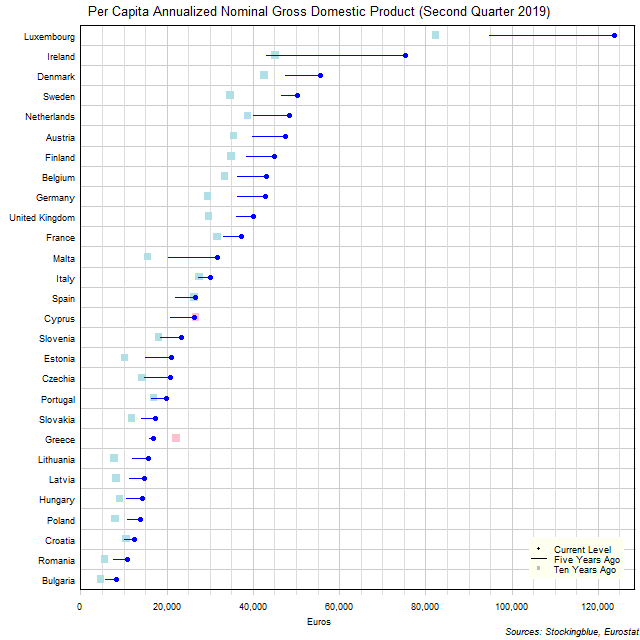
The chart above shows the per capita annualized nominal gross domestic product (GDP) in each EU state as of the second quarter of 2019 in euros, the change from five years ago, and the per capita GDP ten years prior. Luxembourg and Ireland had exceptional growth over the past five years.
Findings
- The difference between the state with the largest per capita GDP, Luxembourg, and the state with the smallest, Bulgaria, is €115,395.47 (up from €89,069.55 five years ago and up from €77,603.41 ten years ago). Luxembourg and Bulgaria had the largest and smallest per capita GDP respectively both five and ten years ago.
- Luxembourg has 14.86 times the per capita GDP that Bulgaria does. The ratio of largest per capita GDP to smallest per capita GDP was down from 16.65 five years ago and down from 17.55 ten years ago.
- The median per capita GDP in the 28 EU states is €26,461.10 (up from €20,495.17 five years ago and up from €24,213.21 ten years ago) and the mean €33,294.76 (up from €26,586.81 five years ago and up from €24,332.51 ten years ago).
- All states saw their per capita GDP rise in current euros over the past five years.
- Twenty-six states saw their per capita GDP rise in current euros over the past ten years while two saw their per capita GDP decline.
Caveats
- GDP data is from the second quarters of 2019, 2014, and 2009.
- Census data is from 2001 and 2011.
- The data is seasonally adjusted in current euros.
- The data is annualized by multiplying the quarterly figure by four.
- All figures are rounded to the nearest hundredth.
Details
In absolute terms, Greece saw the smallest increase over the past five years with a rise of €1,015.73. Ireland had the largest growth with a gain of €32,360.50. Over the past ten years, Greece had the largest decrease with a drop of €5,215.13 while Luxembourg had the greatest increase with a gain of €41,428.34.
In relative terms, Greece had the smallest increase over the past five years with a 6.38% rise in per capita GDP while Ireland had the greatest increase with a 75.35% rise in per capita GDP. Over the past ten years, Greece had the largest decrease with a 23.55% drop in per capita GDP while Estonia had the largest growth with a 105.47% rise in per capita GDP.
There were three states with a per capita GDP of over €40,000 ten years ago, five states five years ago, and ten states now. Conversely, there were 13 states with a per capita GDP of less than €20,000 ten years ago, 13 states five years ago, and ten states now.
Malta overcame the most states in the five year period moving up three spots in the rankings from the 15th highest per capita GDP to the 12th. Conversely, Greece was surpassed by three states in the five year period going from having the 18th highest per capita GDP to the 21st. Over the past ten years, Malta surpassed six states going from the 18th highest per capita GDP to the 12th, while Greece was surpassed by six going from the 15th largest per capita GDP in the EU to the 21st.
Data
| State | Second Quarter 2009 | Second Quarter 2014 | Second Quarter 2019 |
|---|---|---|---|
| Austria | 35,536.26 | 39,675.93 | 47,408.07 |
| Belgium | 33,387.33 | 36,317.17 | 42,916.42 |
| Bulgaria | 4,688.16 | 5,690.53 | 8,324.44 |
| Croatia | 10,531.34 | 10,160.34 | 12,491.7 |
| Cyprus | 26,687.73 | 20,763.3 | 26,252.07 |
| Czechia | 14,329.87 | 14,844.59 | 20,872.4 |
| Denmark | 42,557.97 | 47,346.67 | 55,534.23 |
| Estonia | 10,186.69 | 15,047.15 | 20,930.76 |
| Finland | 34,872.8 | 38,352.64 | 44,971.09 |
| France | 31,639.71 | 32,988.58 | 37,149.27 |
| Germany | 29,504.71 | 36,357.08 | 42,720.12 |
| Greece | 22,147.16 | 15,916.3 | 16,932.03 |
| Hungary | 9,046.99 | 10,642.56 | 14,333.75 |
| Ireland | 45,062.92 | 42,946.47 | 75,306.97 |
| Italy | 27,542.32 | 27,351.26 | 29,943.11 |
| Latvia | 8,188.21 | 11,335.75 | 14,684.43 |
| Lithuania | 7,838.49 | 11,941.47 | 15,711.52 |
| Luxembourg | 82,291.57 | 94,760.08 | 123,719.91 |
| Malta | 15,542.58 | 20,227.04 | 31,668.31 |
| Netherlands | 38,746.95 | 40,046.38 | 48,396.81 |
| Poland | 7,949.61 | 10,821.56 | 13,782.43 |
| Portugal | 16,915.44 | 16,299 | 19,834.29 |
| Romania | 5,536.45 | 7,444.45 | 10,753.85 |
| Slovakia | 11,799.4 | 14,067.38 | 17,344.86 |
| Slovenia | 18,098.64 | 18,387.18 | 23,360.38 |
| Spain | 26,279.25 | 22,026.62 | 26,670.14 |
| Sweden | 34,700.94 | 46,523.49 | 50,147.11 |
| United Kingdom | 29,700.77 | 36,149.75 | 40,092.78 |
Sources
Eurostat. 2019. "GDP and Main Components." Accessed December 23, 2019. https://appsso.eurostat.ec.europa.eu/nui/show.do?query=BOOKMARK_DS-406779_QID_-2B92021B_UID_-3F171EB0&layout=TIME,C,X,0;GEO,L,Y,0;UNIT,L,Z,0;S_ADJ,L,Z,1;NA_ITEM,L,Z,2;INDICATORS,C,Z,3;&zSelection=DS-406779UNIT,CP_MEUR;DS-406779INDICATORS,OBS_FLAG;DS-406779S_ADJ,SCA;DS-406779NA_ITEM,B1GQ;&rankName1=UNIT_1_2_-1_2&rankName2=INDICATORS_1_2_-1_2&rankName3=NA-ITEM_1_2_-1_2&rankName4=S-ADJ_1_2_-1_2&rankName5=TIME_1_0_0_0&rankName6=GEO_1_2_0_1&sortC=ASC_-1_FIRST&rStp=&cStp=&rDCh=&cDCh=&rDM=true&cDM=true&footnes=false&empty=false&wai=false&time_mode=NONE&time_most_recent=false&lang=EN&cfo=%23%23%23%2C%23%23%23.%23%23%23.
Eurostat. 2017. "Population change - Demographic balance and crude rates at national level." Accessed December 11, 2017. http://appsso.eurostat.ec.europa.eu/nui/show.do?query=BOOKMARK_DS-054722_QID_690C8C0A_UID_-3F171EB0&layout=TIME,C,X,0;GEO,L,Y,0;INDIC_DE,L,Z,0;INDICATORS,C,Z,1;&zSelection=DS-054722INDICATORS,OBS_FLAG;DS-054722INDIC_DE,JAN;&rankName1=INDICATORS_1_2_-1_2&rankName2=INDIC-DE_1_2_-1_2&rankName3=TIME_1_0_0_0&rankName4=GEO_1_2_0_1&sortC=ASC_-1_FIRST&rStp=&cStp=&rDCh=&cDCh=&rDM=true&cDM=true&footnes=false&empty=false&wai=false&time_mode=NONE&time_most_recent=false&lang=EN&cfo=%23%23%23%2C%23%23%23.%23%23%23.